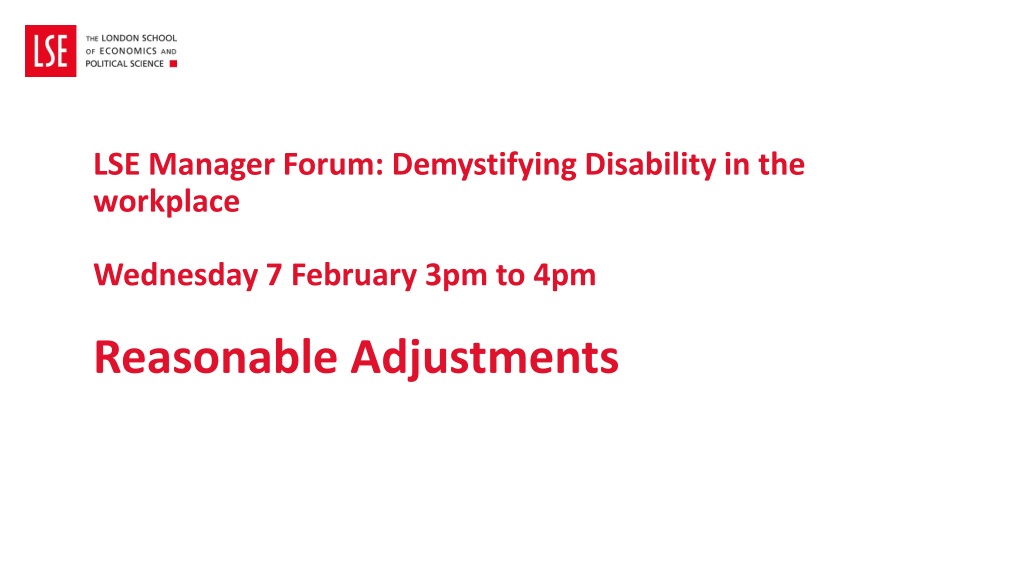

Replay
0 likes | 18 Views
This forum at LSE delves into the legal duty under the UK's Equality Act 2010 for employers to make reasonable adjustments in the workplace to accommodate disabled employees. It covers what constitutes 'reasonable' adjustments, examples of such adjustments, and resources available for support. The session emphasizes the importance of addressing barriers, including physical, attitudinal, and policy-related obstacles, and highlights key factors employers should consider when determining the reasonableness of adjustments.

E N D
LSE Manager Forum: Demystifying Disability in the workplace Wednesday 7 February 3pm to 4pm Reasonable Adjustments
Reasonable Adjustments • Legal duty to address barriers • What is ‘reasonable’? • Examples of adjustments • Important to remember! • Resources and support available
Reasonable Adjustments – our legal duty • As stipulated by the UK’s Equality Act 2010, LSE is required to make adjustments, or changes to working environments or working practices/arrangements needed by disabled employees to fulfil their role. • The term reasonable adjustment comes from the Equality Act 2010, but they are also known as workplace adjustments, accommodations or changes. • Employers must make reasonable adjustments for potential employees who apply for jobs. • Failing to make reasonable adjustments for disabled people could be disability discrimination under the Equality Act 2010.
Reasonable Adjustments – What are barriers? Barriers can be: • Physical – for example, a set of stairs or • Assumptions or attitudes – of other people about a disabled person’s abilities • Policies or practices – such as fixed working hours or locations, performance management policies or expected ways of communicating. Employers need to remove or reduce the impact of these barriers.
Reasonable Adjustments – what is ‘Reasonable’? • There are a number of factors which the law says employers should consider when trying to decide if an adjustment is reasonable: • Effectiveness – how well does the adjustment in question remove or at least minimisethe disadvantage? • Practicability– how practical is the adjustment? For example, how long will it take to implement, will anyone need extra training, etc? • Cost – for example, how much will it cost, what financial resources available to the organisation (including schemes such as Access to Work, for example), can your organisation afford it? • Disruption – how disruptive to the business, to others, and to the needs of the organisation would it be to make this adjustment? • Risk – would making this adjustment cause any risk to others? (Note: An adjustment will not be ‘reasonable’ if anyone’s health and safety would be compromised by making that adjustment.)
Reasonable Adjustments - examples • During recruitment: • Providing extra time during an interview • Providing the questions in writing • Rest breaks • Campus tours
Reasonable Adjustments - examples • For existing employees: • Adjustments to the physical environment, eg, widening a doorway or building a ramp • Exploring flexible working hours, either on a long-term or more temporary basis, for example changes to start/finish times, additional breaks, working from home • Acquiring or modifying equipment, eg, providing an adapted keyboard • Providing assistive software, as required for the role (such as speech-to-text software) • Where possible, providing information in alternative accessible formats (such as large print, audio or Braille) • Ensuring online team meetings/other activities are accessible
Reasonable Adjustments - examples • For academic and teaching staff: • Scheduling classes and/or rooms appropriately so that the needs of both students and the academic can be met as far as reasonably possible • Adjustments to their role (such as flexible working hours) may be required that allow them to focus on all core elements of the role, ie, teaching, research and citizenship.
Important to remember! • Document any agreed adjustments and share with employee • Not all disabled employees will be experts in their own condition or know what they need • Reviewing adjustments is crucial to success! • Access to Work does not replace our duty to make adjustments • Help and support is available!
Resources and support • Reasonable Adjustments Pocket Guide • LSE Disability Policy • Consult with HR Partner or Staff Disability and Mental Health Adviser • Access to Work helpline • Register with the Business Disability Forum (LSE are members) to access resources
Thank you! Thoughts/suggestions/questions? Feel free to get in touch via l.h.mu@lse.ac.uk